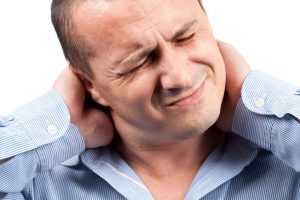Your neck is made up of vertebrae that extend from the skull to the upper torso. Cervical discs absorb shock between the bones. The bones, ligaments, and muscles of your neck support your head and allow for motion. Any abnormalities, inflammation, or injury can cause neck pain or stiffness.
Many people experience neck pain or stiffness occasionally. In many cases, it’s due to poor posture or overuse. Sometimes, neck pain is caused by injury from a fall, contact sports, or whiplash.
Most of the time, neck pain isn’t a serious condition and can be relieved within a few days. In some cases, neck pain can indicate serious injury or illness and require a doctor’s care. If you have neck pain that continues for more than a week, is severe, or is accompanied by other symptoms, seek medical attention immediately.
Causes of neck pain
Neck pain or stiffness can happen for a variety of reasons.
Muscle tension and strain
This is usually due to activities and behaviors such as:
- poor posture
- working at a desk for too long without changing position
- sleeping with your neck in a bad position
- jerking the neck during exercise
Injury
The neck is particularly vulnerable to injury, especially in falls, car accidents, and sports, where the muscles and ligaments of the neck are forced to move outside of their normal range. If the neck bones, or cervical vertebrae, are fractured, the spinal cord may also be damaged. Neck injury due to sudden jerking of the head is commonly called “whiplash.”
Heart attack
Neck pain can also be a symptom of a heart attack, but it often presents with other symptoms of a heart attack, such as:
- shortness of breath
- sweating
- nausea
- vomiting
- arm or jaw pain
If your neck hurts and you have other symptoms of heart attack, call an ambulance or go to the emergency room immediately.
Meningitis
Meningitis is an inflammation of the thin tissue that surrounds the brain and spinal cord. In people who have meningitis, a fever and a headache often occur with a stiff neck. Meningitis can be fatal and is a medical emergency. If you have the symptoms of meningitis, seek help immediately.
Other causes
Other causes include the following:
- Rheumatoid arthritis causes pain, swelling of the joints, and bone spurs. When these occur in the neck area, neck pain can result.
- Osteoporosis weakens bones and can lead to small fractures. This condition often happens in hands or knees, but it can also occur in the neck.
- Fibromyalgia is a condition that causes muscle pain throughout the body, especially in the neck and shoulder region.
- As you age, the cervical discs can degenerate. This is known as spondylosis or osteoarthritis of the neck. This can narrow the space between the vertebrae and adds stress to your joints.
- When a disc protrudes, as from a trauma or injury, it may add pressure to the spinal cord or nerve roots. This is called a herniated cervical disc, also known as a ruptured or slipped disc.
- Spinal stenosis occurs when the spinal column narrows and causes pressure on the spinal cord or the nerve roots as it exits the vertebrae. This can be due to long-term inflammation caused by arthritis or other conditions.
In rare instances, neck stiffness or pain occurs due to:
- congenital abnormalities
- infections
- abscesses
- tumors
- cancer of the spine
When to see your doctor
If symptoms persist for more than a week, consult with your doctor. You should also see a doctor if you have:
- severe neck pain without apparent cause
- a lump in your neck
- a fever
- a headache
- swollen glands
- nausea
- vomiting
- trouble swallowing or breathing
- weakness
- numbness
- tingling
- pain that radiates down your arms or legs
- an inability to move your arms or hands
- an inability to touch your chin to your chest
- bladder or bowel dysfunction
If you’ve been in an accident or fall and your neck hurts, seek medical care immediately.
How to ease neck pain at home
If you have minor neck pain or stiffness, take these simple steps to relieve it:
- Apply ice for the first few days. After that, apply heat with a heating pad, hot compress, or by taking a hot shower.
- Take OTC pain relievers, such as ibuprofen or acetaminophen.
- Take a few days off from sports, activities that aggravate your symptoms, and heavy lifting. Resume normal activity slowly as your symptoms ease.
- Exercise your neck every day. Slowly stretch your head in side-to-side and up-and-down motions.
- Use good posture.
- Avoid cradling the phone between your neck and shoulder.
- Change your position often. Don’t stand or sit in one position for too long.
- Get a gentle neck massage.
- Use a special neck pillow for sleeping.
- Don’t use a neck brace or collar without your doctor’s approval. If you don’t use them properly, they can make your symptoms worse.
What is the outlook for people with neck pain?
Many people experience neck pain because of poor posture and muscle strain. In these cases, your neck pain should go away if you practice good posture and rest your neck muscles when they’re sore. Make an appointment with your doctor if your neck pain isn’t improving with home treatments.




